⚡ZurzAI.com⚡
Companies Similar to Etched.ai
Syntiant
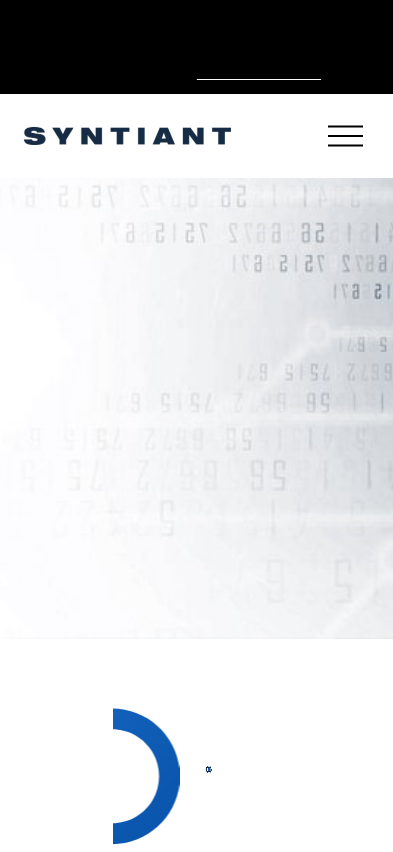
The article discusses advancements in Edge AI technologies, featuring efficient neural processors, MEMS sensors, and machine learning models that enhance performance, privacy, and user experience.
Syntiant Corporation operates in the realm of Edge Artificial Intelligence (AI), with a primary focus on deploying deep learning models that enhance performance for edge devices across various industries, including consumer electronics, automotive, industrial, and smart home markets.
Key Focus Area: Syntiant specializes in developing hardware and software solutions capable of processing data at the edge, thereby eliminating the reliance on cloud-based data centers. This is intended to provide enterprises and consumer devices with capabilities for real-time data processing, enhanced user privacy, and reduced latency, significantly cutting down on cloud-related expenses.
Unique Value Proposition and Strategic Advantage:
- Versatile Neural Decision Processors (NDP): These processors boost efficiency and throughput compared to traditional low-power microcontrollers, designed to run sophisticated deep learning models on power-constrained devices.
- MEMS Microphones & Sensors: With over 20 billion units shipped, Syntiant emphasizes compact, high-performance microphones and sensors capable of high-quality audio capture even in noisy environments. Their technology aims to provide robust communication solutions across different sectors.
- Hardware-Agnostic Machine Learning Models: Their models are ready-to-deploy, designed to integrate seamlessly with existing systems, reducing time to market for new embeddings into products.
Value Proposition Deliverables:
- Deep Learning Models & Processors: These facilitate energy-efficient, high-throughput processing capabilities right on the device, thus transforming traditionally cloud-reliant AI processes into localized solutions.
- Customization and Scalability: The company offers multi-generational product lines, allowing for scalability of applications ranging from small wearables to large automotive systems, adaptable to both legacy and leading-edge hardware.
- Industry-Specific Applications: Syntiant provides solutions tailored specifically for domains like automotive (security and driver assistance systems), government (secure, deployable edge solutions), and smart homes (home security and automation systems).
Furthermore, Syntiant supports a range of edge AI applications through initiatives and collaborations with key technology players, thereby enhancing its portfolio of solutions for varied market needs. Their emphasis on partnerships with organizations such as Qualcomm and Renesas to provide integrated solutions shows a concerted drive towards comprehensive ecosystem support.
In summary, Syntiant focuses on bringing powerful AI capabilities to the edge of technology infrastructure, seeking to revolutionize how consumer devices, industrial applications, and embedded systems process data through innovative hardware and software solutions. Their strategic positioning through versatile processors, reliable sensors, and partnerships with industry leaders forms a core component of their market differentiation.
SiMa.ai
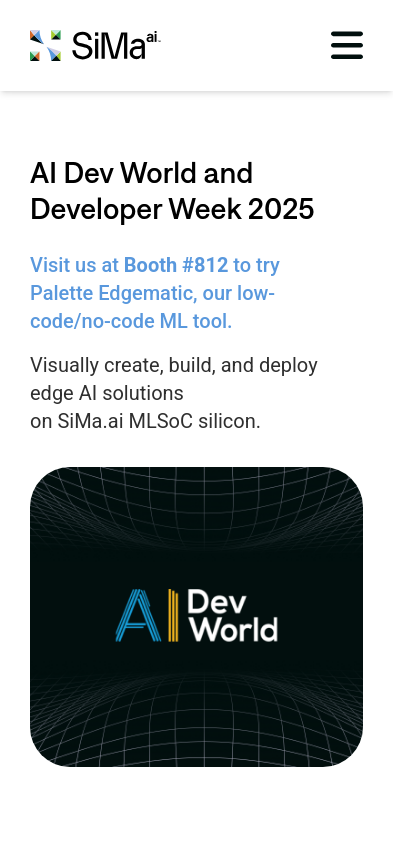
SiMa.ai creates chips for AI workloads at the edge, offering a "software-centric" platform for multimodal applications. SiMa.ai™ is a machine learning company delivering the industry’s first software-centric purpose-built MLSoC™ platform for effortless ML deployment and scaling at the embedded edge.
About | About | News | Leadership | Leadership | About
SiMa.ai is primarily focused on revolutionizing machine learning (ML) at the embedded edge. Their core offering is their Machine Learning System on Chip (MLSoC™), a purpose-built platform aimed at addressing varied computer vision challenges across multiple industry sectors, such as automotive, industrial, healthcare, drones, smart vision and retail, and the government sector.
Key Focus Area: The key focus of SiMa.ai is making ML "effortless" across diverse edge applications by providing high-performance, low-power solutions integrated within MLSoC™. With a push-button software experience, SiMa.ai targets complex scenarios in areas like autonomous vehicles, industrial automation, healthcare data processing, and smart retail, where energy efficiency and real-time processing are critical.
Unique Value Proposition and Strategic Advantage: SiMa.ai’s unique value proposition lies in their MLSoC™—a comprehensive, single-chip solution that supports a broad spectrum of models, including CNNs, Transformers, and Generative AI. Their strategic advantages include:
- Performance and Power Efficiency: Offering up to 10x better performance per watt compared to competitors, SiMa.ai addresses the industry's need for high throughput with reduced power consumption.
- Software-First Approach: By focusing on software-centric design, SiMa.ai allows for seamless, rapid deployment and iteration of ML models, making it user-friendly and adaptable for developers.
- Scalability and Versatility: Their platform accommodates future and legacy ML models, expanding its usability across multiple use cases and industries.
Delivering on Value Proposition: SiMa.ai operationalizes its value proposition through:
-
MLSoC Family and Board Solutions: Their offerings include the MLSoC Modalix, with configurations tailored for different performance needs (25 to 200 TOPS). This ensures adaptability to market demands for smart vision systems, drones, industrial automation, and smart cities.
-
Palette Software Platform: A dedicated software suite that simplifies the development, testing, and deployment of ML solutions across edge applications. This platform enables integration of custom ML solutions through a no-code/low-code approach, making it accessible and reducing the technical barrier for businesses.
-
Effortless Integration and Deployment: SiMa.ai’s solutions provide plug-and-play integration and are designed to be versatile enough to support multiple sensors and devices, all while ensuring secure data handling with built-in privacy features.
-
Strategic Partnerships: Collaborations with industry leaders like Synopsys and TRUMPF enhance SiMa.ai’s offerings in specific sectors like automotive and industrial applications, further cementing their foothold in these industries.
-
Customer-Centric Approach: Engaging actively with clients in over 50 leading companies, they strive for meticulous adaptation of their solutions to meet specific client needs.
In conclusion, SiMa.ai positions itself as a transformative player in the embedded edge ML market with its scalable, energy-efficient, and user-friendly approach ready to tackle complex computing challenges with speed and simplicity.
SenseTime
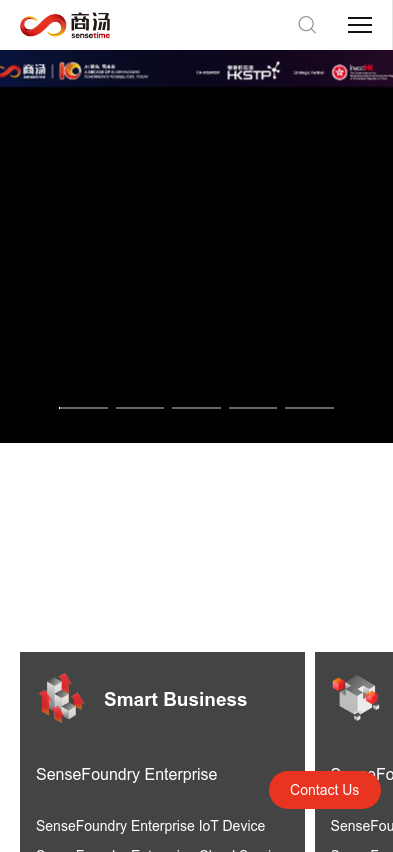
SenseTime is revolutionizing multiple industries by deploying its AI technologies and infrastructure, enhancing applications in smart business, cities, life, and automotive sectors.
-
Key Focus Area: SenseTime primarily focuses on artificial intelligence (AI) technology development and application, catering to diverse industry verticals. The company engages in creating AI-enhanced solutions for businesses, smart cities, smart life, healthcare, education, and automotive sectors.
-
Unique Value Proposition and Strategic Advantage: SenseTime's competitive edge lies in its proprietary technologies and its AI infrastructure, specifically the SenseCore AI Cloud. This infrastructure supports high computation capabilities and expansive algorithmic implementations, which lower costs and enhance scalability of AI applications. The emphasis on research and partnerships with academic institutions further solidifies its position, allowing it to integrate cutting-edge AI research into practical applications.
-
How They Deliver on Their Value Proposition:
-
Diverse AI Applications: SenseTime offers a multitude of AI-driven platforms such as SenseFoundry for businesses and cities, SenseME for smart living, SenseMARS for metaverse solutions, and SenseAuto for intelligent automobiles. These platforms serve to streamline digital transformation and enhance operational efficiencies.
-
Extensive Product Suite: The company's product offerings range from AI-enabled content generation and enhancement to medical image analysis, covering a comprehensive spectrum of AI applications.
-
Research and Development: SenseTime invests significantly in AI research, engaging with top universities and contributing to open-source projects. Their collaboration with The Chinese University of Hong Kong to offer OpenMMLab demonstrates their commitment to fostering innovation and adopting an ecosystem approach.
-
Technical Infrastructure: The SenseCore AI Cloud integrates AI chips and sensors, providing a robust foundation for processing substantial data and training large-scale machine learning models quickly. This infrastructure is crucial for the rapid deployment and adaptation of AI applications across industries.
-
Smart Solutions: In smart cities, simulations, and traffic management, they implement AI platforms like SenseFoundry to optimize and enhance public service functionalities and infrastructure efficiency. In the automotive sector, SenseAuto utilizes AI for safe and adaptive autonomous driving technologies.
-
Healthcare Applications: By leveraging medical image analysis tools like SenseCare, they aid healthcare workflows, targeting areas such as diagnosis, treatment, and recovery.
-
Innovations in AI: SenseTime's emphasis on advancements such as augmented reality and 3D reconstruction tools aids their entry into new realms like the metaverse, showcasing their adaptability and commitment to emerging tech trends.
Through these strategic initiatives and technical capabilities, SenseTime positions itself as a pivotal player in deploying scalable AI solutions tailored to complex real-world challenges across multiple domains.
Shield AI

Shield AI develops autonomous systems for military use, including drones and AI-powered command software for real-time decision-making and situational awareness.
Shield AI specializes in developing autonomous systems for defense and commercial applications, focusing on artificial intelligence (AI) pilots that enable autonomous operations of drones and aircraft without GPS, communication, or human intervention.
Key Offerings:
-
Hivemind AI Pilot: Hivemind is an AI system designed to function like a human pilot, adapting and responding to various environments and mission requirements autonomously. It can be deployed in diverse operations ranging from dogfighting F-16 jets to close-quarters combat in complex indoor environments with the Nova drone systems.
-
V-BAT Drones: These versatile, vertical takeoff and landing (VTOL) systems offer significant surveillance and reconnaissance capabilities. They have been tested and deployed in various settings, including maritime operations, and are favored by U.S. and allied military forces for their simplicity and effectiveness in contested environments.
-
ViDAR Sensors: ViDAR (Visual Detection and Ranging) is a passive, AI-powered sensor system that enhances the detection, tracking, and classification of objects across broad areas. It is suitable for both military reconnaissance and civil applications like search and rescue and counter-narcotics operations.
-
Sentient Tracker: This system integrates AI to enhance the tracking capabilities within electro-optical (EO) and infrared (IR) video feeds, automating the detection of moving targets with enhanced accuracy.
Strategic Developments:
Shield AI has expanded its operations into international markets by establishing partnerships and local presences. For example, it has forged a collaboration with JSW Group in India to manufacture and deploy V-BAT drones locally, aiming to strengthen India’s defense capabilities and serve as a global production hub. Additionally, Shield AI has started training Ukraine's military forces with its V-BAT systems, establishing a base in Kyiv to support these operations.
Key Partnerships:
Shield AI has deepened its partnership with Palantir Technologies to enhance command and control systems for autonomous operations. This partnership focuses on integrating Palantir’s software capabilities with Shield AI's Hivemind for large-scale, autonomous missions in environments where traditional communication and GPS systems are unreliable.
Leadership and Vision:
Founded by former Navy SEAL Brandon Tseng and others in 2015, Shield AI aims to revolutionize defense and civilian aviation sectors with autonomous systems. The company is committed to empowering military operations through AI, short-circuiting the kill chain in conflict scenarios without the need for traditional human intervention.
Mission Statement:
Shield AI is committed to safeguarding service members and civilians with advanced autonomous systems. The company continually explores new AI technologies and applications in defense technologies to ensure operations are conducted with precision and high efficiency, minimizing risks and operational costs.
Career and Team:
With a focus on intelligent systems and advanced technologies, Shield AI offers opportunities for those interested in AI, engineering, and defense solutions. The company provides a collaborative work environment with benefits like flexible working hours and competitive compensation packages.
By utilizing cutting-edge AI and autonomy technology, Shield AI continues to address the complexities of modern warfare and commercial aviation, emphasizing on intelligent and autonomous solutions.
edison.ai

edison.ai employs image recognition and AI to analyze social media data, focusing on cashierless checkout solutions.
Edison.a.ai is a company focused on leveraging advanced technologies such as AI, image analysis, and blockchain technology to deliver solutions that benefit both businesses and society. Here's an overview of their service offerings and business areas:
Business Segments:
-
Generative AI:
- Utilizes image-generation AI and large-scale language models (LLMs) to enhance user productivity.
- Provides solutions across various industries including marketing, entertainment, retail, and logistics.
- Expertise in technologies like Generative Adversarial Network (GAN) and Transformer models, offering innovative AI generation solutions.
-
AI Business:
- Offers AI solutions tailored to customer needs using proprietary AI algorithms, covering processes from modeling to service deployment.
- Focus areas include big data and image analysis, utilizing technology that can handle low-quality images and has extensive camera equipment knowledge.
- Applications include automatic image classification, facial recognition, text analysis, and medical image diagnosis.
-
Web3 Business:
- Develops and supports blockchain technology solutions, aiding entry into Web3-related businesses.
- Specializes in areas such as NFT, DAO, and DeFi.
- Offers consulting services and solutions that integrate blockchain and AI, with a focus on cryptocurrency market and finance knowledge.
-
Cashierless Store Business:
- Employs AI and sensor technologies to enable cashierless retail environments.
- Enhances shopping experiences by allowing customers to pay through smartphone apps and exit stores without traditional checkout processes.
- Aims to optimize space and reduce staffing needs, while offering real-time shopper movement tracking and data insights.
-
Software and Hardware Development:
- In addition to their flagship offerings, the company also engages in software development like database construction and the creation of data analysis tools, as well as small to medium-scale hardware projects.
Innovations and News:
- Free Services: Launching services such as "img.ai" and "LLM Hub" to provide users with free, accessible tools for image generation and comparison of open-source Japanese LLMs, respectively.
- Leadership and Collaborations: Leadership involvement in initiatives such as the "General Incorporated Association Generation AI Utilization and Promotion Association (GUGA)" and educational positions to promote AI knowledge like at the Professional University of Information and Management for Innovation.
- Industry Recognition and Media: Features in media outlets like NHK Japan for safety detection systems in transportation and contributions by company leaders to platforms like News Picks.
Technical and Market Advantages:
- Proprietary Technologies: Focusing on proprietary AI algorithms allows for in-depth customization and tuning, often seen as an alternative to more generic open-source solutions.
- Global Information Utilization: With English as the operational language, Edison.a.ai keeps pace with international advancements in blockchain technologies by actively engaging with global tech communities.
Contact Information:
- Interested parties can reach out via [email protected] for inquiries related to services, partnerships, and more specialized solutions.
Overall, Edison.a.ai positions itself at the intersection of technology and industry demands, striving to make impactful changes through intelligent solutions across various business landscapes.
Refact.ai
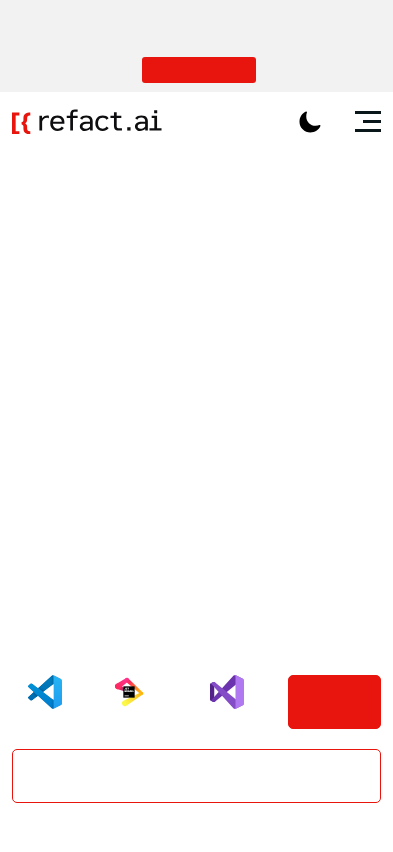
Refact.ai is an open-source AI coding assistant with self-hosted options ideal for data security-conscious companies.
Summary of Refact.ai's Strategic Outlook
1) Key Focus Area:
Refact.ai is centered on enhancing developer productivity through its customizable AI coding assistant. Their solution targets accelerating code completion processes, facilitating interactive in-IDE chat support, and providing a robust AI Toolbox tailored to individual or organizational requirements.
2) Unique Value Proposition and Strategic Advantage:
-
Customization and Flexibility: Refact.ai offers users the ability to select from a comprehensive array of large language models (LLMs), allowing customization across different coding environments and needs. This adaptability is complemented by the option to fine-tune AI models using a company’s codebase, thereby aligning the assistant closely with specific coding practices and style guides.
-
Deployment Options: Organizations can choose between cloud-based solutions and self-hosted versions, providing flexibility in data control and privacy. This is particularly advantageous for enterprises needing to maintain strict data governance.
-
Cross-IDE Compatibility: It supports a wide range of integrated development environments (IDEs) like VS Code, JetBrains, and more, ensuring that the solution is accessible and adaptable to various coding contexts and workflows.
3) Delivery on the Value Proposition:
-
AI-Driven Code Completion: Utilizing techniques like Retrieval-Augmented Generation (RAG) and fine-tuning capabilities, Refact.ai enhances code completion with high contextual awareness, providing relevant and accurate suggestions during the coding process.
-
Integrated Chat Functionality: Developers can interact with an AI chat embedded within the IDE to ask questions, seek explanations, request code modifications, or generate new code segments. This feature is especially useful for enhancing code understanding and collaboration directly in the coding environment.
-
Toolbox for Code Management: The AI Toolbox empowers developers with functions to refactor, explain, document, and even generate code, fostering a more efficient coding lifecycle. Users can personalize commands within the toolbox, tailoring it to their specific coding operations.
-
Data Privacy and Security: Deploying Refact.ai on self-hosted servers ensures that users maintain control over their data, which never leaves their secure environments. This supports organizations with stringent data policies by keeping telemetry data and other sensitive information on-premise.
-
Comprehensive Support and Documentation: The company provides detailed guides and documentation to ease the setup and use of the platform, alongside offering priority support for enterprise customers to help with integration and operational challenges.
Refact.ai positions itself as a versatile and privacy-focused AI assistant aimed at optimizing development workflows by integrating seamlessly with existing infrastructure and providing advanced AI capabilities tailored to enhancing coding efficiency and collaboration.
Phot.ai

Phot.AI is a comprehensive AI-powered platform that simplifies photo editing and graphic design through a wide range of tools designed to help e-commerce sellers optimize their workflows.
Summary for Phot.AI
-
Key Focus Area: Phot.AI is primarily focused on providing AI-driven solutions for creative image manipulation and design enhancement. Their tools cater to various artistic, marketing, and design needs, allowing users to generate, edit, and enhance images through artificial intelligence.
-
Unique Value Proposition and Strategic Advantage: Phot.AI's unique value proposition lies in its extensive toolkit of over 30 AI-powered functions designed to simplify and revolutionize the design and editing process. Offering a rapid and automated approach to image creation and enhancement, they provide strategic business advantages by integrating AI technology to significantly speed up workflows, minimize manual effort, and enhance marketing and visual content quality.
Key components of their strategic advantage include:
- A diverse range of tools that cover basic to advanced image editing needs such as background removal, object replacement, image upscaling, and vector generation.
- Tailored templates and design automation that support branding, product photography, and advertising needs.
- AI-driven creativity that allows users to generate new visuals directly from text prompts, which can be utilized across various creative scenarios including fashion, branding, and digital storytelling.
-
Delivery on Value Proposition: Phot.AI delivers on its value proposition through the following mechanisms:
-
Comprehensive Tools: The platform hosts a variety of AI-driven tools catering to different design requirements, from simple touch-ups to generating artistic images and complex vector art. They range from the AI Art Generator to the AI Tattoo Art Creator, offering endless possibilities for customization and innovation.
-
User-Friendly Access: Phot.AI offers easy access to its tools without requiring extensive technical knowledge. This is achieved through cloud-based services that allow users to create and edit visuals directly through a web browser on any device, eliminating the need for traditional, complex software installations.
-
API Integration: Businesses and developers can integrate Phot.AI’s capabilities into their own applications and workflows through provided APIs, promoting seamless automation and enhancing operational efficiency.
-
Diverse Utility: The company's solutions are versatile and applicable across multiple sectors, including e-commerce for product visual enhancement, social media for eye-catching post creation, and personal use like tattoo design and home decor.
-
Community Engagement: Phot.AI fosters a community of users who contribute to and access a vast selection of AI-generated designs, further promoting creativity and application of their tools in numerous contexts.
-
In conclusion, Phot.AI positions itself as a comprehensive AI-powered platform that simplifies visual design and enhances artistic expression, catering to both entrepreneurial and creative markets through an array of innovative tools and seamless integration opportunities.
Hyperspec AI
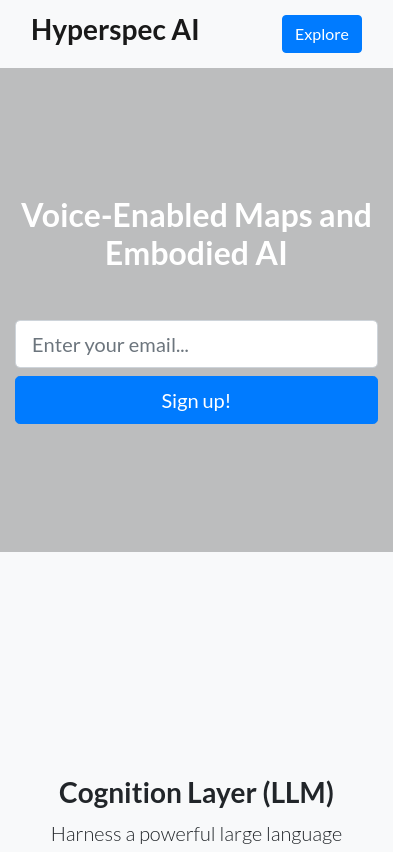
Combines multisensor data with AI to provide insights for environmental monitoring and autonomous navigation.
Hyperspec AI Overview: A Business Perspective
1) Key Focus Area: Hyperspec AI is dedicated to the intersection of artificial intelligence and autonomous technology, with a particular emphasis on robotics and AI for complex decision-making and real-time data integration. The company harnesses a powerful large language model (LLM) to process map metadata, sensor data, and domain-specific knowledge. Their solution is aimed at crafting adaptive AI systems capable of functioning dynamically across changing environments.
2) Unique Value Proposition and Strategic Advantage: Hyperspec AI’s strategic advantage lies in its robust cognitive framework that unifies various data streams—visual, LiDAR, radar, and GPS—into a coherent intelligence system. This seamless integration enables autonomous agents to not only gather but also interpret and respond to real-world variables effectively. Their solution offers these distinct capabilities:
- Generative Policies and Code: Dynamically generate and modify operational guidelines and code, facilitating rapid response to changing compliance requirements and accelerating development workflows.
- Real-Time Sensor Fusion: High-fidelity 3D maps are continuously updated with live sensor data, allowing users to maintain situational awareness and gain geospatial insights.
- Agentic AI: Embedding decision-making agents within applications to enhance user experience and ensure that AI systems can learn and adapt autonomously.
3) Delivery on Value Proposition: Hyperspec AI delivers its propositions through several key offerings and technological innovations:
- Cognition Layer (Large Language Model): Utilizes a sophisticated language model to integrate and analyze map and sensor data, driving informed decision-making.
- Workflow Orchestration: Automates mission-critical processes with intelligent orchestration capabilities, handling task dependencies and optimizing productivity.
- Voice & Maps for Enterprises: Empowers businesses by integrating voice commands with advanced geospatial data, streamlining activities from site planning to data analysis.
The company is actively engaging with modern enterprises that benefit from these solutions, positioning itself as an enabler of improved operational productivity through advanced AI-driven insights.
Conclusion: Hyperspec AI positions itself at the frontier of AI and autonomous technologies by focusing on the development of cognitive capabilities in robotics systems. Through innovative solutions such as real-time sensor fusion, generative policies, and agentic AI, it offers unique advantages in dynamic environments that demand constant adaptation and real-time decision-making. The suite of solutions aims to enhance productivity and operational efficacy for a variety of enterprise applications, all while grounded in their expertise in computer vision and AI. However, these offerings and claims should be considered marketing positions rather than proven benchmarks, highlighting the need for potential clients to consider practical outcomes and existing case studies.
TWO.AI
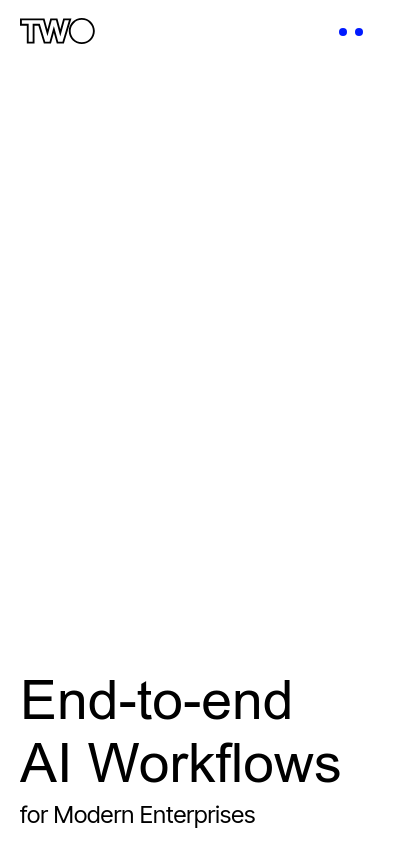
TWO.AI is an AI startup contributing to the innovative landscape in India's AI sector.
-
Key Focus Area:
TWO is a technology company focused on redefining human-AI interaction through its proprietary multilingual AI models, SUTRA. The company aims to offer cost-effective AI-powered solutions that facilitate conversation, search, and visual interactions across more than 50 languages. The focus is on creating adaptable AI services for various sectors including finance, healthcare, retail, and enterprise services. -
Unique Value Proposition and Strategic Advantage:
The company's unique value proposition lies in its SUTRA models, characterized by a dual-transformer architecture that separates concept learning from language acquisition. This approach enables the models to be more inference-cost efficient, responsive, and adaptable across multiple languages compared to its competitors.Strategic Advantages:
- Multilingual Capabilities: Supports over 50 languages, exceeding many leading large language models in terms of efficiency and performance in non-English languages.
- Customizable AI Solutions: Tailored options that cater to specific industry needs and enterprise environments.
- Efficiency and Scalability: Their purpose-built tokenizer and model architectures reduce computational costs significantly, facilitating faster model deployment and real-time applications.
-
How They Deliver Their Value Proposition:
- Technological Suite: TWO offers a suite of API-based solutions through its SUTRA models for enterprise integrations, allowing businesses to customize their AI implementations based on specific use-case requirements. These include models such as SUTRA-Pro, SUTRA-Light, and SUTRA-Avatar.
- SUTRA-Online: This model leverages real-time data from the web to provide up-to-date responses, unlike traditional offline models with stale datasets.
- Industry-Specific Solutions: Direct engagement with industries like finance and healthcare through specialized models, ensuring alignment with regulatory needs and operational demands.
- On-Premise Solutions: Introducing SUTRA-OP for organizations needing on-premise AI with robust privacy and security features, applicable in heavily regulated fields.
- Global Reach and Partnerships: TWO expands its influence through strategic partnerships and investments, notably from companies like Jio Platforms and NAVER, enhancing its footprint in Asia.
Through these initiatives, TWO positions itself to penetrate various markets by offering scalable, efficient, multilingual AI solutions, aligning technology with business transformation needs. Their projects such as ChatSUTRA, ZAPPY, and SUTRA-Avatar illustrate a commitment to integrate AI beyond traditional textual interactions, envisioning AI as an integral part of daily life and commerce, ultimately broadening the effective market reach.
Insight AI
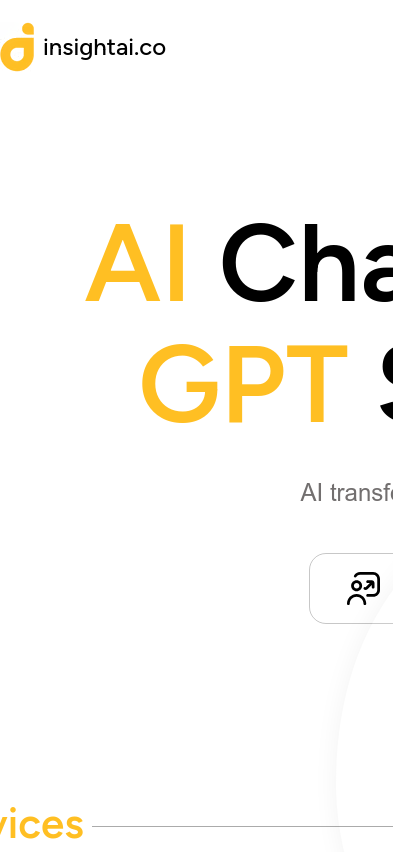
Insight AI is a fintech company offering AI-powered solutions like AI underwriting and cash flow forecasting to enhance financial decision-making.
-
Key Focus Area: Insight AI concentrates on the development and deployment of AI-driven solutions, specifically focusing on AI chatbots and automation for businesses. Their services cater to organizations looking to incorporate artificial intelligence into their processes to enhance efficiency, streamline operations, and provide data-driven insights.
-
Unique Value Proposition and Strategic Advantage: Insight AI leverages custom AI chatbots and automated workflows adapted to a company's specific informational context. The strategic advantage is their methodology of using organization-specific data, enabling seamless integration into existing business operations. This tailored approach allows businesses to optimize internal processes by providing precise interactions and automations grounded in their proprietary data.
- Customization and Specificity: Insight AI’s leverage of company-specific training ensures solutions align closely with existing data systems, such as internal wiki pages and document repositories.
- Privacy and Security: Through data cleansing processes, they ensure sensitive information is protected, bolstering client trust in AI implementations.
- No-Code and Low-Code Solution Flexibility: By using platforms like Stack-AI, RelevanceAI, and Python, they accommodate both rapid development needs and the customization depth for complex tasks.
-
Delivering on Their Value Proposition: Insight AI implements its value proposition through several key methods and technological strategies:
-
AI Chatbots: Custom chatbots facilitate employee and customer interactions, drawing from a company’s specific data to provide prompt replies. This is critical in industries where quick and factual responses are necessary for operations or customer service improvements.
-
Automation Pipelines: Businesses can automate routine tasks, such as report generations and test evaluations, thus reducing manual labor and human error. For instance, automated reporting processes use pre-defined templates and sequential prompts to generate detailed reports.
-
AI Knowledge Bots and Tools: For example, tools are created for use in specialized sectors such as ERP providers and financial consulting, ensuring the AI is relevant and valuable to a company's unique needs.
-
Advanced Technology Stack: Utilizing advanced large language models (LLMs) like GPT-4o and GPT-4 Turbo, Insight AI is able to ensure robust and scalable AI solutions that are adaptable to various business scenarios.
-
In sum, Insight AI's approach combines the harnessing of custom AI technologies with an emphasis on practical applicability, privacy, and technology integration. They strive to enable businesses to better utilize their proprietary data, enhancing productivity and decision-making processes across different verticals.
Stark AI

Stark AI specializes in HR solutions, particularly in job placement using AI. Stark AI is a job placement platform that uses AI to improve human resource processes.
Company's Key Focus Area
Stark.ai specializes in leveraging artificial intelligence to streamline the job search and recruitment process. The company targets multiple facets of the employment market, focusing on job seekers, employers, educational institutions, and staffing agencies. Stark.ai aims to simplify job placement and talent acquisition through technology-driven solutions like resume building, AI-driven job matching, interview preparation, and recruitment automation.
Unique Value Proposition and Strategic Advantage
-
AI-Powered Tools: Stark.ai markets itself as pioneering AI-driven solutions that transform job searching and recruitment. The integration of AI enables efficiency in matching candidates with job opportunities more accurately and swiftly compared to traditional methods.
-
Diverse Features for Various Stakeholders:
- Job Seekers: Offers tools such as AI-powered resume optimization, AI mock interviews, personalized job matches, and an auto-apply function, which are designed to improve their visibility and success rate in job applications.
- Employers: Provides access to a vast candidate database and AI-driven video interviews, helping organizations reduce the time and cost involved in hiring processes.
- Colleges and Staffing Firms: Supports these institutions in enhancing placement strategies with AI resources, mock interviews, and candidate progress tracking, aiming to bridge the gap between education and employment effectively.
-
Free and Accessible Model: Stark.ai emphasizes democratizing access to its tools, providing many features at no cost and offering flexible options for utilizing additional services through credits. This accessibility can potentially broaden their user base and enhance their market reach.
Delivering on Their Value Proposition
-
Technology and Integration: Stark.ai employs advanced AI algorithms to streamline the job application process. Their technology assesses user profiles, aligns them with job descriptions, and identifies potential matches, reducing the legwork for both job seekers and employers.
-
Automation and Efficiency: By offering tools like the auto-apply feature and a Chrome extension, Stark.ai simplifies the application submission across multiple platforms, thereby saving time for users.
-
Community and Partnership Focus: Stark.ai aims to cultivate a community-based approach where users can earn or purchase credits for accessing premium features. This creates an ecosystem of shared growth, enhancing the effectiveness of the platform.
-
Comprehensive Support: For employers, Stark.ai's suite includes video interview capabilities, AI-driven candidate assessments, and a career portal, providing a more holistic recruitment solution. Meanwhile, colleges benefit from tools that improve student employability through mock interviews and real-time feedback.
-
Security and Trust: Stark.ai assures users of data security, employing encryption and stringent measures to protect user information, which is crucial in maintaining trust and credibility in a digital platform.
Stark.ai's strategic advantage lies in its leveraging of AI to automate and enhance traditional recruitment processes, making them faster and potentially more precise, aiming to deliver significant value to job seekers, employers, and educational institutions alike. However, as this information is promotional, users should independently assess the platform’s claims and suitability for their needs.
Axelera AI

Axelera AI specializes in AI acceleration for edge computing applications, with a platform called Metis for handling computer vision inference.
Axelera AI is primarily focused on delivering high-performance AI hardware acceleration solutions designed for edge computing. Their key focus areas include generative AI, computer vision inference, and making AI accessible and efficient across various markets, including security, retail, industrial, and automotive sectors.
Unique Value Proposition and Strategic Advantage:
-
AI Acceleration Hardware: Axelera AI's Metis platform, including AI Processing Units (AIPUs) and acceleration cards like PCIe and M.2, claims to deliver unprecedented performance with high throughput and low energy consumption.
-
Integrated Hardware and Software Solutions: The company's offer encompasses hardware paired with an easy-to-use software stack, the Voyager SDK, which simplifies the deployment of AI models. This combined offering emphasizes usability, power efficiency, and cost-effectiveness.
-
Digital In-Memory Computing Technology: Axelera AI prides itself on using Digital In-Memory Computing (D-IMC) and RISC-V dataflow architectures. This technology minimizes data movement between memory and compute units, supposedly overcoming traditional memory bandwidth constraints and power inefficiencies.
-
Partnership and Ecosystem: Collaborations with companies like Arduino aim to enhance the accessibility of AI at the edge. By leveraging Arduino’s open-source community and Axelera’s hardware acceleration, the partnership aims to democratize AI innovations for a broader audience.
Delivery on Value Proposition:
-
Product Offerings: The Metis Compute Board and Accelerator Cards provide comprehensive solutions for AI inference at the edge. These products aim to bridge the gap between cutting-edge AI technology and practical implementation by offering ready-to-deploy systems that require minimal additional development from users.
-
Cost and Power Efficiency: Axelera’s technology is touted as being significantly more energy-efficient and cost-effective compared to traditional AI solutions like GPUs. This is achieved through their specialized architecture and quantization techniques that enhance output without compromising accuracy.
-
Flexible and Scalable Platform: Through the Metis evaluation systems, Axelera AI caters to a wide array of applications, including video analytics and quality inspection, capable of handling multiple high-resolution video streams simultaneously. The scalability of the platform allows it to integrate seamlessly with existing systems, enhancing its practicality and future-proofing capabilities.
-
Strategic Geographic and Market Expansion: With significant investment backing, Axelera AI plans to broaden its market reach into North America, Europe, and the Middle East. This expansion strategy aims to support the growing demand for efficient AI solutions and support computing needs across various new application domains including automotive and digital health.
-
Client Engagement and Community Building: Through events, partnerships, and an online store, Axelera AI encourages engagement, offering personalized demonstrations of their technology to drive client and community uptake.
Axelera AI is positioning itself as a key player in the edge AI space, focusing on hardware that claims to deliver high efficiency and performance while addressing cost and power consumption challenges. Their strategic partnerships and planned expansions underscore a commitment to evolving with market demands and enhancing AI accessibility globally.
AI EdgeLabs
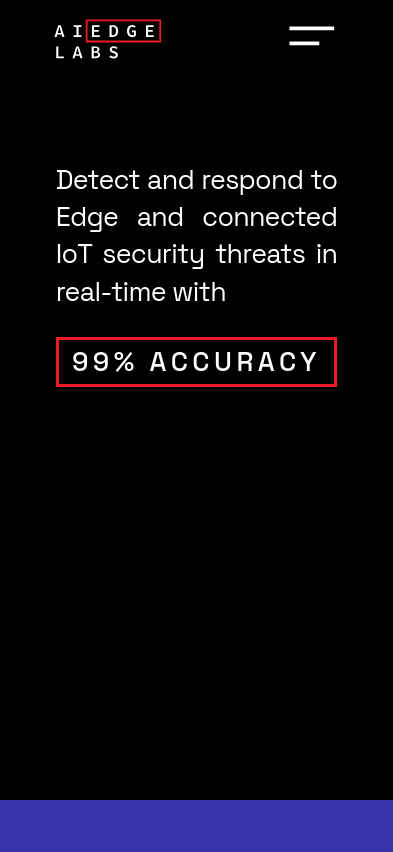
AI EdgeLabs is a startup that specializes in cybersecurity for edge computing and distributed Linux environments, offering Linux-based EDR and NDR solutions for comprehensive threat detection and proactive response.
Executive Summary
AI EdgeLabs focuses on providing cybersecurity solutions specifically tailored for Edge and IoT environments. Their primary objective is to secure these systems against various threats such as malware, ransomware, DDoS, and botnets. The solutions are designed to automate response and offer real-time protection and remediation.
Key Focus Area
The company's core focus is on delivering cybersecurity for Edge and IoT infrastructures. This includes high-risk industries such as Retail, Telecom, Automotive, Oil & Gas, Transportation, Healthcare, Manufacturing, Agriculture, and Smart Cities. They emphasize the unique vulnerabilities and security challenges of Edge computing, particularly in environments that are often decentralized and lack robust digital security.
Value Proposition and Strategic Advantage
AI EdgeLabs presents a unique value proposition by offering autonomous cybersecurity powered by AI, utilizing machine learning and reinforcement learning models. Their strategic advantage lies in their ability to detect zero-day threats and provide a real-time response mechanism. Key features include:
- Autonomous Threat Detection: Utilizing AI models to identify and act on threats without needing prior labeling, enabling rapid and efficient response.
- Threat Analysis and Anomaly Detection: Through behavior-based analytics and reinforcement learning algorithms, they can offer advanced threat monitoring and severity-based prioritization.
- Centralized Management: Their platform offers full visibility through a centralized dashboard, aiding in lifecycle support for threat disposition and mitigation.
Implementation of Value Proposition
AI EdgeLabs delivers on its promises through several strategic approaches:
-
AI-Powered Platforms: The AI EdgeLabs Sensor is a proprietary telemetry agent deployed at Edge nodes, offering continuous network analysis and threat modeling to secure infrastructures.
-
Comprehensive Coverage and Scalability: AI EdgeLabs can be integrated with various partner platforms like Sunlight, Supermicro, and OnLogic, ensuring broad compatibility and scalability. Its integration extends to various installation environments, including Kubernetes and Linux-native setups.
-
Partnerships and Integration: The company partners with major technology providers such as AWS, Sunlight, and Lenovo to advance edge cyber defense, offering seamless integration and comprehensive protection across distributed edge environments.
-
Security Features: The platform includes network visibility, automated incident response, and integration with diverse security information and event management (SIEM) systems, supporting a spectrum of cybersecurity operations.
Conclusion
AI EdgeLabs leverages its proprietary technology and strategic partnerships to address the emerging challenges in Edge and IoT security. By focusing on automation, AI technology, and real-time threat mitigation, the company positions itself as a prominent provider of security solutions capable of protecting intricate infrastructure across various high-stakes industries. While their claims are forward-thinking, it is essential to consider them as strategic marketing from the company itself.
EdgeQ

EdgeQ intends to fuse AI compute and 5G within a single chip. The company is pioneering converged connectivity and AI that is fully software-customizable and programmable.
1) What is this company's key focus area?
EdgeQ focuses on advancing wireless infrastructure, emphasizing the integration of 4G, 5G, and Artificial Intelligence (AI) within a robust, scalable, and economically efficient framework. The company positions itself at the intersection of connectivity and compute technology, providing solutions that fuse telecommunications with artificial intelligence enhancements.
2) What is their unique value proposition and strategic advantage?
-
Base Station-on-a-Chip: EdgeQ is credited with introducing the industry's first Base Station-on-a-Chip, combining 4G, 5G, and AI capabilities in a singular, compact silicon that oversees functionality traditionally managed by multiple devices. This offering grants unprecedented cost and power savings, utilizing just one-chip for infrastructure demands.
-
Open, Software-Defined Architecture: Their approach is uniquely software-defined and fully programmable, allowing operators to configure and upgrade networks effortlessly through software, circumventing the traditional costs associated with hardware changes. This provides flexibility in deployment and reduces operational burdens.
-
O-RAN (Open Radio Access Network) Compatibility: By aligning with the principles of O-RAN, EdgeQ supports standardized interfaces, which facilitate interoperability among different vendors, further reducing the complexity and costs associated with deploying and managing wireless network infrastructure.
3) How do they deliver on their value proposition?
-
Integrated Comprehensive Solution: EdgeQ's Base Station-on-a-Chip offers an all-in-one solution that integrates baseband processing, network processing units (NPUs), CPUs, and AI capabilities. This highly consolidated approach optimizes network deployment by providing scalability and efficiency.
-
Customization and Upgradability: EdgeQ utilizes a software-first approach that allows for considerable customization and over-the-air upgradability. Thus, enterprises can dynamically adjust spectrum usage and scale operations as needed without the need for physical infrastructure changes.
-
Mission-Critical Applications: By supporting private 5G solutions and power over ethernet setups, EdgeQ caters to mission-critical use cases requiring Ultra-Reliable Low Latency Communication (URLLC), making it viable for industries like industrial automation and real-time data processing.
-
Partnerships and Ecosystem Integration: Collaborations with industry leaders such as Vodafone emphasize EdgeQ's strategy to leverage its platform within existing and emerging infrastructure ecosystems, thereby validating their technologies' application and scalability in real-world deployments.
In summary, EdgeQ leverages its innovative Base Station-on-a-Chip technology, combined with a software-defined and open architecture, to deliver comprehensive, customizable, and cost-effective solutions for the evolving needs of wireless infrastructure. Their approach facilitates flexibility, adaptability, and enhanced networking capabilities for operators while aligning with modern telecommunications paradigms like O-RAN.
Etched.ai

Etched.ai is an AI chip startup that develops Sohu, a chip designed specifically for running transformer models.
Overview
Etched positions itself prominently in the AI hardware market by focusing on specialized chips for artificial intelligence called ASICs, particularly tailored for transformer models such as those used in most advanced AI systems today, including ChatGPT. Their flagship product, the Sohu chip, seeks to provide a faster and more cost-effective alternative to traditional GPUs.
Key Focus Area
- Specialization in AI Hardware: Etched develops application-specific integrated circuits (ASICs) specialized for transformers. These chips are crafted to outperform general-purpose GPUs in running transformer AI models.
Unique Value Proposition and Strategic Advantage
-
Increased Efficiency and Performance: By embedding transformer architecture directly into the hardware, Sohu promises significant performance improvements in terms of speed and cost when running transformer-based AI models. This specialization allows for a marked increase in throughput, with claims of over 500,000 tokens processed per second compared to NVIDIA’s next-gen GPUs.
-
Focused Design for Specific AI Models: Sohu is designed to exclusively handle transformer inference, a common task across modern AI applications like ChatGPT and image models like Stable Diffusion. This dedication to a specific model type allows for removing superfluous control-flow logic, enhancing the chip's utility for its intended applications.
-
Predictable Scalability: By concentrating specifically on scaling transformer architecture, the Sohu ASIC aims to meet and even anticipate the scaling demands of contemporary AI tasks without the need for comprehensive GPU programmability, resulting in better resource allocation for known workloads.
Delivery on Value Proposition
-
Specialized Hardware Optimization: Sohu’s design reduces reliance on generalized GPUs by specializing solely in transformer operations, enabling a higher density of computational power tailored directly to these tasks.
-
Open Source Software Support: Etched offers an open-source software stack to accommodate customized transformer layers, facilitating organizations’ specific requirements without the typical constraints associated with proprietary systems.
-
Real-World Application Testing: Through partnerships—like the one with Decart in developing the interactive AI model Oasis for generating video games—Etched highlights Sohu's capability to handle complex, compute-intense applications beyond theoretical constructs, augmenting the practicality of its claims.
Conclusion
Etched endeavors to carve out a niche for itself in the AI hardware landscape via Sohu, emphasizing transformative acceleration and cost efficiencies over general-purpose GPU solutions. This narrow focus on application-specific optimization, combined with an open-source approach to software, attempts to provide a compelling argument for its strategic advantage in handling burgeoning AI workloads. Nonetheless, prospective adopters should critically assess how the restricted utility beyond transformers fits their broader needs.
Liquid AI
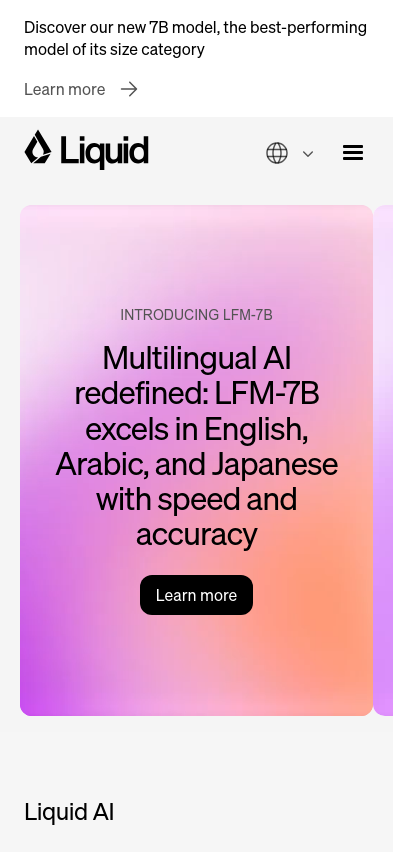
Liquid AI focuses on developing advanced, general-purpose AI systems that align with human values and trustworthiness.
Liquid AI, an MIT spin-off based in Boston, primarily focuses on developing general-purpose AI systems that are capable, efficient, and scalable. Their efforts are centered around creating AI foundation models that leverage innovative architectures and theoretical foundations in machine learning, signal processing, and numerical linear algebra.
Key Focus Area: Liquid AI's main focus is the development of general-purpose AI systems through its Liquid Foundation Models (LFMs). These models are structured to handle various forms of sequential data across numerous industries, including financial services, biotechnology, and consumer electronics. Their LFMs, notably the LFM-7B, are designed to provide comprehensive AI functionalities that are both energy and memory efficient.
Unique Value Proposition and Strategic Advantage:
- Innovation in AI Architecture: Liquid AI emphasizes a shift from traditional transformer-based models, such as GPTs, to their own non-transformer-based architectures. This pivot reportedly allows their models to be highly efficient, offering superior performance with reduced computational demands.
- Multilingual and Multi-modal Capabilities: Liquid AI asserts that its LFMs excel in multiple languages, including English, Arabic, and Japanese, and are adaptable to various industry-specific applications.
- Low Memory Footprint: The architecture of LFMs ensures a minimal memory footprint, which is posited to lead to cost-efficiency in deployment and tuning processes.
- Strategic Collaborations and Funding: Liquid AI has garnered a significant $250M Series A funding primarily led by AMD Ventures, alongside collaborations with influential entities like Capgemini and ITOCHU, to scale their products and penetrate various markets effectively.
How They Deliver on Their Value Proposition:
- Model Deployment and Customization: Liquid AI offers models that can be finely tuned and deployed directly on-premises or on edge devices. Through their Liquid Engine, they provide high-performance AI solutions that are claimed to adapt to enterprise-specific needs with reduced latency and enhanced privacy.
- Comprehensive Model Stacks: The LFMs come with integrated inference and customization stacks that allow enterprises to adapt the technology for private, secure, and specific use cases.
- AI Integrated Platforms: Their products are available for trial and integration through several accessible platforms, such as Amazon Bedrock and the Liquid Playground, aiming to make LFMs versatile and easy to access for development teams.
- Rapport with Strategic Partners: They actively work on creating AI solutions in collaboration with partners, like their joint projects with Capgemini to develop new capabilities in AI domains such as edge solutions and enterprise AI transformations.
Liquid AI seems to position itself as a forerunner in the transition to advanced, efficient AI models tailored for broad applications, purporting to reduce carbon footprints associated with traditional AI infrastructure and facilitate easier deployment and customization for enterprises. Nonetheless, it's important to recognize these claims as part of a marketing narrative.
Untether AI
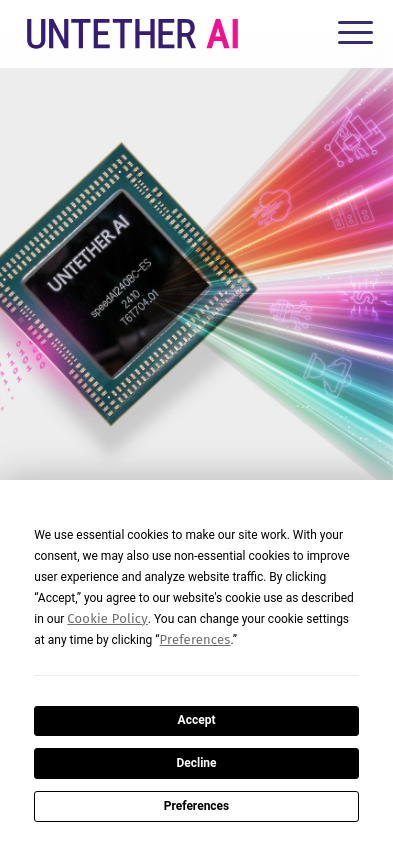
Untether AI focuses on improving AI inference efficiency and reducing energy consumption, developing the SpeedAI accelerator cards for enhanced performance in AI applications.
Key Focus Area
Untether AI is concentrated on enhancing AI inference performance for various applications through the creation of advanced hardware solutions. Their primary aim is to facilitate the deployment of artificial intelligence (AI) from the cloud to the edge across multiple sectors, such as AgTech, automotive, government, and financial services. They focus on accelerating AI inference tasks, promoting performance, energy efficiency, and cost-effectiveness.
Unique Value Proposition and Strategic Advantage
Untether AI’s unique value proposition lies in its novel at-memory compute architecture. This architecture positions the processing element directly next to memory cells, thereby reducing the power consumption associated with data movement, which traditionally dominates AI workloads. This setup diminishes the need for larger data transfers, leading to significant operational efficiency and exceptionally high compute density, making it particularly appealing for high-performance, power-sensitive AI applications. Their products offer energy-efficient AI operations, which claim to outperform traditional systems by providing higher throughput and lower power usage.
Delivery on the Value Proposition
To achieve their value proposition, Untether AI delivers a suite of products comprising integrated circuits (ICs), accelerator cards, and software development kits:
-
AI Inference Accelerator ICs: These include the runAI200 and the speedAI240. The ICs exploit an at-memory architecture for optimal compute density and low power consumption. They support a variety of AI workloads, from vision-based networks to transformer networks, catering to needs across automotive, finance, agriculture, and government sectors.
-
AI Accelerator Cards: Untether’s cards, such as the tsunAImi tsn200 and tsunAImi tsn800, are designed for high-demand inference tasks, delivering substantial performance in a power-efficient manner. They incorporate features suitable for both server-grade and edge applications, making AI deployment more broadly feasible.
-
Software Development Kit (imAIgine SDK): This SDK enables seamless model transition from popular frameworks like TensorFlow and PyTorch to Untether AI’s hardware. It offers a Model Garden and custom development flows that support the rapid deployment of AI solutions, emphasizing ease of integration and operational flexibility.
-
Target Markets and Applications: Untether AI focuses on sectors like agricultural technology (AgTech), automotive, financial services, and government applications, where AI can deliver substantial improvements in operational efficiency, safety, and sustainability. For example, in AgTech, AI assists in precision farming and crop monitoring, while in automotive, it enhances advanced driver-assistance systems (ADAS).
Overall, Untether AI emphasizes an innovative approach to overcoming AI deployment challenges, delivering higher performance and efficiency through a unique hardware design that benefits from reduced power consumption and increased density of compute resources. Their strategic partnerships and compliance with industry standards further support their market positioning in enabling AI across diverse operational environments.
Abacus.AI
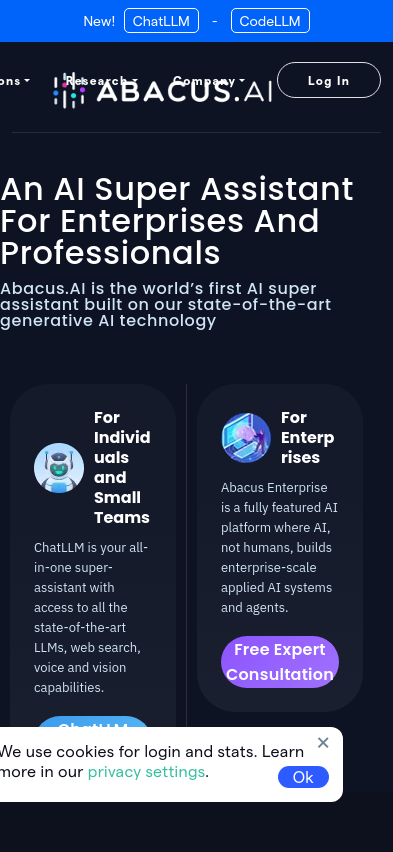
Abacus.AI enables businesses to implement AI without needing expert developers by offering pre-trained models for tasks like customer service and forecasting. Abacus.AI offers pre-trained models for business tasks like customer service, simplifying AI implementation without expert developers.
News | About | About | About | About | About | About | About | About | About | About | About | About | About | Vision/Values | About | Vision/Values | About | About | About | About | About | About | About | About | About | About | About | About | About | About | About | About | About | About | About | About
-
Company's Key Focus Area: Abacus.AI is primarily focused on providing AI-driven solutions tailored for both individual professionals and large enterprises. Their main goal is to automate and enhance business processes through the use of AI technology. This includes a broad range of applications, such as predictive modeling, personalization, anomaly detection, and AI-based decision-making tools. They offer platforms and tools to build AI agents and chatbots, optimize resources through discrete optimization, and utilize vision AI for modeling tasks.
-
Unique Value Proposition and Strategic Advantage: Abacus.AI positions itself as an AI super-assistant that leverages generative AI technology to automate various business processes. Their strategic edge lies in their state-of-the-art AI capabilities, including structured machine learning, vision AI, and personalized solutions, along with a commitment to open-source generative AI models. They claim that their AI systems can enhance productivity and efficiency by automating complex tasks and reducing human intervention.
-
Delivery on Their Value Proposition: To deliver on its value proposition, Abacus.AI employs:
-
AI Super Assistants: Tools like ChatLLM and CodeLLM are designed to integrate AI capabilities across platforms, providing services like web search, image generation, and code editing.
-
Comprehensive AI Platform: For larger organizations, they offer a platform capable of building enterprise-scale AI systems, using AI to create and manage other AI agents and processes. This platform aims to automate tasks such as fraud detection, contract analysis, and personalized marketing.
-
Structured ML and Predictive Modeling: Abacus.AI provides tools to create machine learning models tailored to specific data inputs, ensuring accurate business predictions and process optimizations.
-
Vision AI and Optimization: These services offer advanced solutions for image analysis and optimizing business processes under given constraints, aimed at reducing costs and increasing efficiency.
-
Integration and Customization: The company offers integration with existing data systems, allowing for customization and personalized setups that fit specific business needs and enable contextual AI interactions.
-
Consultation and Support: They provide consultations to help enterprises tailor the AI solutions to their specific requirements and offer support throughout the implementation process.
-
Overall, their approach focuses on using cutting-edge AI models and deep learning techniques to build custom solutions that improve business process efficiency and decision-making.
Intel
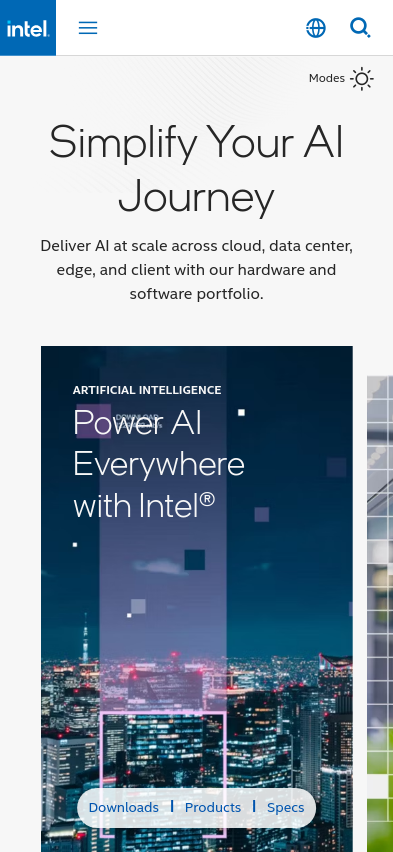
Intel is a market leader in CPUs, expanding its influence in the AI sector with products like the Gaudi 3 chip, aiming to catch up in the GPU arena.
Leadership | About | About | Leadership | About | About
Intel's Strategic Focus and Deliverables
1) Key Focus Area:
Intel is highly focused on Artificial Intelligence (AI) innovation across various industries and technological platforms. Their efforts span from traditional areas like processors and computing hardware to cutting-edge solutions that integrate AI across data centers, cloud computing, and enterprise systems.
2) Unique Value Proposition and Strategic Advantage:
- Open Platform for Enterprise (OPEA): Intel provides a comprehensive AI ecosystem that includes silicon, software, and tools, allowing enterprises to harness AI's potential across devices from PC to edge and data centers. This strategy is aimed at various industries, including financial services, manufacturing, healthcare, and retail.
- AI-Powered Performance: Their newest product offerings, such as the Intel® vPro® PCs and Core™ Ultra processors, are tailored to enhance productivity with integrated AI capabilities, improving everything from security to computing efficiency.
- Scalability and Edge Solutions: Intel's platforms, such as the Tiber™ AI Cloud, are designed to streamline the deployment of AI solutions at an enterprise scale and across edge environments.
- Enterprise Solutions: Intel underscores the capability of their systems to glean actionable insights from data, driving automation and enhancing decision-making processes, which serves as a significant business advantage to clients.
3) Delivering on the Value Proposition:
- Comprehensive Product Portfolio: Intel offers a wide range of products including processors (Intel® Core™ Ultra and Intel® Xeon®), graphics solutions with their Arc™ series, and AI accelerators, which support AI workload demands.
- Tools and Partnerships: With resources like the OpenVINO™ toolkit for AI model optimization and the oneAPI Toolkits for unified programming, Intel caters to developers seeking efficiency and innovation. They also leverage extensive partnerships for joint solutions and industry standards.
- Enhanced Security and Manageability: Intel platforms focus on security with hardware-level protections and remote management capabilities, critical for enterprise environments.
- Empowering the Workforce: Solutions like Intel vPro® are aimed at fortifying businesses with robust security tools and optimizing device management, thus allowing tech teams to focus more on innovation than maintenance.
- Development Resources: Through its Developer Zone and resources, Intel promotes easy access to its software tools and solutions that support innovation, scalability, and performance optimization. This aids developers in crafting solutions easily across various technology stacks.
- Evidence of Impact: Intel documents case studies, such as those with financial and agriculture sectors, demonstrating their AI solutions achieving significant efficiency improvements and cost reductions.
Final Thoughts:
Intel continues to strategically position itself as a provider of diverse technological platforms and solutions, placing special emphasis on AI innovations. By emphasizing scalable and secure solutions supported by a robust hardware and software ecosystem, Intel aims to not only meet but guide the evolving demands of enterprise-level computing and AI applications.
RaiderChip

RaiderChip is developing a hardware IP core to accelerate generative AI inference on FPGA platforms, emphasizing small to large language models.
Company Focus Area
RaiderChip is a hardware design company specializing in developing neural processing units (NPUs) for generative artificial intelligence (AI). The company's primary focus is accelerating large language models (LLM) on low-cost field-programmable gate arrays (FPGAs). These accelerators aim to advance AI processing efficiency and operate generative AI models entirely locally, without requiring cloud or subscription services. RaiderChip aims to target the burgeoning edge AI market, engaging in embedded solutions capable of running independently from internet connections.
Unique Value Proposition and Strategic Advantage
RaiderChip's unique value proposition lies in offering clients a cost-effective, local AI acceleration solution that prioritizes privacy and efficiency. Their strategic advantage comes from leveraging decades of experience in low-level hardware design to deliver NPUs that maximize memory bandwidth and computational performance, essential for running complex generative AI models efficiently. RaiderChip offers versatile and target-agnostic solutions that work seamlessly with FPGAs and ASIC devices from various suppliers such as Intel-Altera and AMD-Xilinx.
Key differentiators include:
- Fully hardware-based generative AI acceleration, ensuring deterministic performance and energy efficiency.
- Capability to run models offline to ensure data privacy and independent operations, ideal for applications in sensitive areas such as defense, healthcare, and consumer electronics.
- Support for rapid integration of new LLMs and customer-specific fine-tuned AI models without hardware modifications.
Delivering on Their Value Proposition
To drive its mission forward, RaiderChip focuses on several key strategies:
-
Advanced Technology and Design: Their NPUs are specifically optimized for the Transformers architecture, which is foundational for the majority of LLMs. This allows them to process models without the need for additional CPUs or Internet connections.
-
FPGA-based Approach: RaiderChip uses the reprogrammable nature of FPGAs, making their deployed systems adaptable to emerging AI models and updates without significant hardware changes.
-
Quantization Support: By offering models with full floating-point precision and quantized variants, RaiderChip caters to diverse computational needs, providing flexibility and efficiency, especially in resource-constrained environments.
-
Local and Interactive Evaluations: RaiderChip provides interactive demos that allow potential customers to test and evaluate the capabilities of their generative AI solutions, emphasizing a hands-on approach.
-
Frequent Model Support Expansion: Aligning with market trends, they consistently add support for new models like Meta’s latest Llama releases and Falcon from TII of Abu Dhabi, enabling versatile AI applications across different languages and regions.
RaiderChip’s investments in research and development are supported by their recent seed round of one million Euros, further accelerating their growth in a field that continuously evolves with rapid technological advancements. By focusing on local AI acceleration for both performance and privacy, RaiderChip positions itself as a pioneer in generative AI deployment, particularly for applications requiring significant computation near the source of data generation or decision-making.